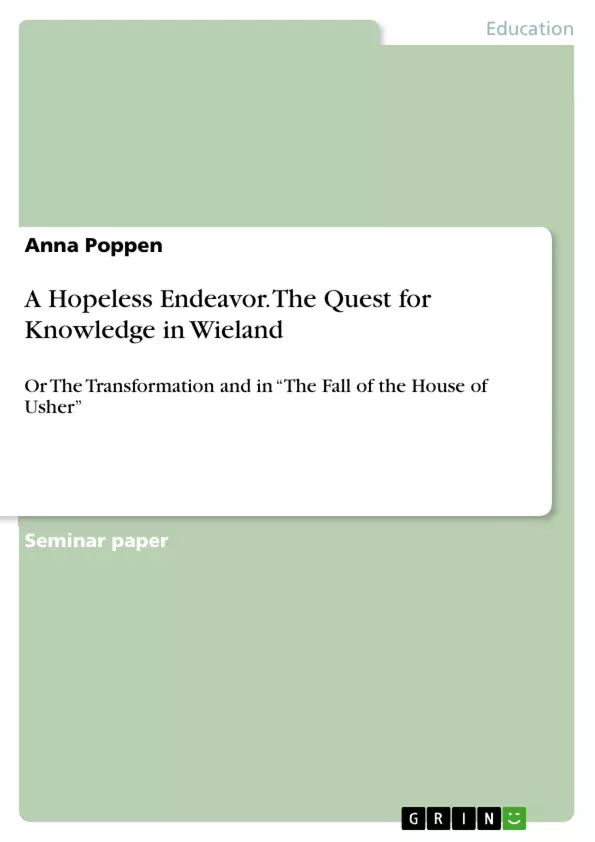Gothic elements, spooky settings and supernatural incidents – these are some things that probably come to people’s minds when they think of Charles Brockden Brown and Edgar Allan Poe. These features definitely appear in most of their stories, for example in Brown’s novel Wieland; or The Transformation and in Poe’s short story “The Fall of the House of Usher”, which will play a major role in this work. When comparing the novel and the short story the reader’s attention is attracted by several parallels between the two stories. The most striking common motifs, which have been pointed out and analyzed by many literary critics , are those of incestuous love and inherited madness. Although I won’t focus on any of these issues in this work, it is always important to keep these parallels at the back of one’s mind.
In the following I am primarily going to concentrate on questions of epistemology, which The Stanford Encyclopedia of Philosophy defines as “the study of knowledge and justified belief” (Stanford Encyclopedia 1). The Encyclopedia states that “[a]s the study of knowledge, epistemology is concerned with the following questions: What are the necessary and sufficient conditions of knowledge? What are its sources? What is its structure, and what are its limits?” (Stanford Encyclopedia 1) Here I’ll mainly be concerned with the sources of knowledge and I will point out how the different characters in Charles Brockden Brown’s novel Wieland; or The Transformation and in Edgar Allan Poe’s short stories “The Fall of The House of Usher” and “The Sphinx” try to make use of these sources.
More precisely, I will argue that Charles Brockden Brown and Edgar Allan Poe show the limits of epistemology by creating characters who try to acquire knowledge through different approaches, but fail in the end. Both authors respond to their cultural and historical background and present a rather pessimistic view of the new American nation.
In the following I will very briefly describe the historical and cultural background of Brown and Poe’s writings and explain to what extent the contents of Wieland, and “The Fall of the House of Usher” are influenced by and related to this background.
Inhaltsverzeichnis (Table of Contents)
- The Sources of Knowledge
- The Importance of the Historical Background
- Historical Background of Charles Brockden Brown's Writings
- Historical Background of Edgar Allan Poe's Writings
- Rationalism as a source of knowledge
- Rationalism in Wieland
- Rationalism in “The Fall of the House of Usher”
- Anti-rationalism and enthusiasm as sources of knowledge
- Anti-rationalism and Enthusiasm in Wieland
- Anti-rationalism and Enthusiasm in “The Fall of the House of Usher”
- Other Concepts as Sources of Knowledge
- The Republican Concept of Vigilance
- Book Learning as a Source of Knowledge
- Transcendentalism as a Source of Knowledge
- The Readers' Reactions and Conclusions
- The Effect on the Reader - Fantastic or Uncanny?
- The Limits of Epistemology
Zielsetzung und Themenschwerpunkte (Objectives and Key Themes)
This work examines the theme of epistemology in Charles Brockden Brown’s novel Wieland; or The Transformation and Edgar Allan Poe’s short stories “The Fall of the House of Usher” and “The Sphinx.” It explores how the characters in these works attempt to acquire knowledge through different approaches, ultimately failing to reach true understanding. The text analyzes the limits of epistemology, particularly in the context of American society and its cultural and historical background.
- The limits of epistemology
- Different approaches to knowledge acquisition
- The role of rationalism and anti-rationalism in acquiring knowledge
- The influence of historical and cultural contexts on characters' epistemological pursuits
- The representation of American society and its anxieties through the lens of epistemology
Zusammenfassung der Kapitel (Chapter Summaries)
The text begins by exploring the sources of knowledge in the works of Brown and Poe, highlighting the parallels between Wieland and “The Fall of the House of Usher.” It then delves into the historical context of both authors, examining the socio-political landscape of the late 18th and early 19th centuries in America. Chapter 3 focuses on rationalism as a source of knowledge, specifically analyzing Pleyel’s character in Wieland as a representative of rational thought. Chapter 4 examines the role of anti-rationalism and enthusiasm in acquiring knowledge, exploring how characters in both Wieland and “The Fall of the House of Usher” grapple with the supernatural and its implications.
Schlüsselwörter (Keywords)
Epistemology, knowledge acquisition, rationalism, anti-rationalism, enthusiasm, supernatural, American literature, Charles Brockden Brown, Edgar Allan Poe, Wieland, “The Fall of the House of Usher,” “The Sphinx,” historical context, cultural influences, American society.
What is the focus of epistemology in Brown's and Poe's works?
The study focuses on the sources, structure, and limits of knowledge as explored through the characters in "Wieland" and "The Fall of the House of Usher."
How does Charles Brockden Brown represent rationalism?
In "Wieland," the character Pleyel represents rational thought, but his eventual failure highlights the limits of reason in understanding the world.
What is the role of the supernatural in these stories?
Both authors use supernatural or gothic elements to challenge the characters' epistemological certainty and create a sense of the "uncanny."
How does the historical background influence the themes?
The socio-political landscape of the late 18th and early 19th century America is reflected in the characters' anxieties and their failed quest for true understanding.
What are the main parallels between Wieland and House of Usher?
Common motifs include inherited madness, incestuous love, and characters who fail to acquire knowledge through their respective approaches.



